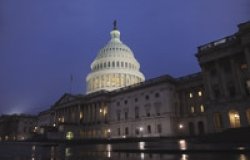Gulliver's Troubles: The Obama Administration and the Middle East
Aaron David Miller, Former Middle East Analyst, Negotiator, and Adviser, U.S. Department of State, and Public Policy Scholar, Woodrow Wilson Center
Overview
When discussing America's policy in the Middle East, the United States is a modern-day Gulliver tied up by tiny tribes whose interests are often not our own; and when they are not tying us up, we are tying ourselves up with our own illusions. That was the assessment of Aaron David Miller, Public Policy Scholar at the Woodrow Wilson International Center for Scholars, at an event hosted by the Wilson Center on the Hill program on December 8, 2009. After introductory remarks by Kent Hughes, Director of the Program on America and the Global Economy at the Woodrow Wilson Center, Miller proceeded to explain this view by laying out a series of essential points that need to be acknowledged and addressed when discussing the Obama Administration's Middle East policies.
First, Miller stated that successful diplomacy requires ownership. A historian by training, Miller argued that progress in the Middle East has always been the result of tribes acting according to regional calculations through acts of war or diplomacy, and not, as some believe, through the actions of superpowers. "No one ever washed a rental car," suggested Miller, implying that it is human nature to care and protect only what one owns.
Second, Miller asserted that in order to understand why the U.S. approach to the negotiations has not succeeded, it is important to realize the significant differences between the United States and the other parties to the negotiations. He attributed America's unrivaled power to "location, location, location." Bordered by non-predatory neighbors and oceans, the United States has a sense of unparalleled physical security that is not shared by those in the Middle East. Miller argued that America's physical location has given rise to an over-optimistic mindset within its citizenry that has helped engender "reckless" foreign policies. Moreover, American's by their nature have a "split the difference" approach to resolving problems – once again, a characteristic not shared by the parties to the negotiations.
Third, Miller emphasized that individuals still matter and strong leaders who are "masters of their constituents, not prisoners of their policies" are vital to successful diplomacy. Miller then pointed to a very small group of leaders, namely Hitler, Stalin, Roosevelt, and Churchill, who were largely responsible for the costliest war of the 20th century, as examples of the power of the individual. He then argued that the current dearth of visionary leaders should not put an end to hope, but it is good reason to put an end to illusions. The goal should be what President Kennedy called, "idealism without illusions."
Fourth Miller, citing his background in history, suggested that leaders need to look to the past when making decisions in order to hedge against the two pitfalls of omnipotence and omniscience. A false sense of either of these leads to hazardous foreign policy decision-making. Instead, Miller maintained that it is essential to understand the ultimate objectives, identify the means to achieve these objectives, and ensure that actions are in line with national interests.
Lastly, Miller discussed current events to emphasize the difficult position in which the U.S. finds itself. Miller characterized the tenuous relationship between Iran and the United States as a battle of politics and science "spinning faster than we can control them." He touched upon the Arab-Israeli conflict and, while urging that all parties involved maintain hope in the process, noted that President Obama's proposal that Israel stop building settlements in the West Bank and other proposals have recently been rejected. It is not a good position for a powerful state, asserted Miller, when small states can repeatedly say "no" to great powers without consequence.
Ultimately, Miller asserted that President Obama must ask himself two questions in order to ensure the United States not become entrenched in a quagmire in the Middle East. First, how important is Arab-Israeli peace to American interests, and second, how much is he willing to risk to begin serious negotiations? If the answer to both is decided with resounding confidence, then, according to Miller, action with required resources is necessary with full commitment. However, if the answers produce vague or hesitant responses, then Miller contended the U.S. should not get involved. He concluded that the overriding priority of American foreign policy as it relates to both the Middle East and throughout the rest of the world is to protect the homeland as best possible. It is this priority that should guide U.S. actions.
By Stephanie Grow
David Klaus, Consulting Director, Wilson Center on the Hill
Thank you for your interest in this event. Please send any feedback or questions to our Events staff.
